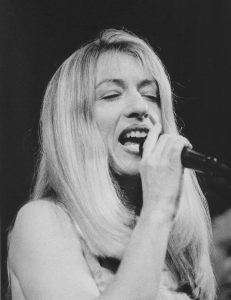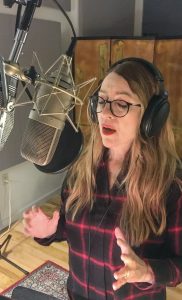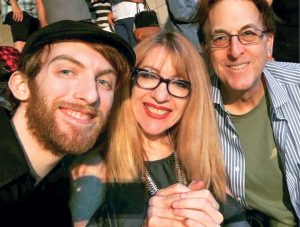Living Buddhism: Hello, Suzanne! We understand you began practicing Buddhism when you were studying to become a classical pianist.
Suzanne Pittson: That’s right. I was a 25-year-old anxious student at San Francisco State University when I began practicing. I had come from a family of musicians and received classical piano training from a young age, with the dream of becoming a concert pianist.
Several years before encountering the SGI, I had developed debilitating stage fright. My body froze, my hands shook, and my mind went blank. My performances were wooden, lacking the easy, exacting muscle memory that, given so many hours of painstaking practice, should have been on hand. This paralyzing anxiety confirmed what I had suspected: that I did not have what it takes to be a professional musician.

Suzanne in Oakland, California, 1999. Photo by Stuart Brinin.
What drove you to continue pursuing music?
Suzanne: My drive to improve as a musician was fueled by jealousy toward the other musicians in my program. Offstage, following those miserable performances, I doubled down practicing. But the next time I stepped onstage, the same thing would happen: All that hard work flew right out the window. Then, a particularly difficult Brahms piece temporarily crippled my right hand. I saw this bout with tendinitis as the end of my piano dreams.
What role did Buddhism play in your craft?
Suzanne: My boyfriend, now husband, Jeff, a fellow pianist, introduced me to Buddism. Chanting Nam-myoho-renge-kyo, I felt my chronic anxiety ease. Jeff would say that he was chanting to become a great musician for kosen-rufu. Though I didn’t fully understand what that meant, I saw that chanting was, for him, a way of affirming his mission to contribute to humanity through music, something I had given up on. Buddhism enabled me to refresh my dream, and so I joined him in chanting abundantly to fulfill my mission as a musician.
That’s quite a shift! What followed?
Suzanne: In addition to playing piano, I had always sung, but only around my house. One of my friends, a singer, reached out to me. She said there was an opening to sing at a local jazz venue and asked if I could fill it. I said yes and accompanied myself on the piano. Amazingly, I tossed off this breezy performance, not overly technical or anxious and with little complaint from my right hand. I felt so comfortable up there that I started to improvise and even scat. Soon after, I was called on again and booked at another venue.
Chanting gave me the confidence to open myself to the possibility of entirely new directions. In addition, Jeff and I began giving financial contributions to the SGI-USA out of our appreciation for our Buddhist practice giving us new possibilities. Getting booked more and enjoying myself each time, I realized what I wanted to do: I wanted to be a jazz vocalist for kosen-rufu.
How would you describe the fortune you created through your contributions?
Suzanne: Jeff and I united in a prayer to take our careers to New York City and make it our place of mission for kosen-rufu. But we were freelancing just to pay the bills and had neither the means nor prospects to justify the move.
United prayer to fulfill our vow gave rise to a spirit of challenge. Alongside other limitations, we tackled our finances head-on. As we increased our financial contributions to the SGI each year, we renewed our spirit to take bold action. In the process, I transcended my creative limitations, both as an artist and as a human being. Our fortune manifested at crucial moments: too many to tally here. We always had enough. Then, in 2005, I was unanimously chosen from a pool of 80 applicants for a full-time, tenured teaching position in the jazz program at the City College of New York.
That’s wonderful! How did your career advance after moving to New York?
Suzanne: I continued to develop a unique and recognizable singing style, releasing a highly technical album based on thorough study of John Coltrane’s masterpiece A Love Supreme. Even as my style became better known and increasingly sought after, however, I began to experience physical issues that affected my voice—allergies, laryngitis, jaw tension, etc. These issues arose with increasing frequency in the middle of performances, causing me to lose my footing and disconnect from the emotion of the song. I began to think, Compared to other singers, who would want to listen to me?
United prayer to fulfill our vow gave rise to a spirit of challenge. Alongside other limitations, we tackled our finances head-on.
This sounds like the doubt you experienced when you were younger.
Suzanne: Yes, my doubts were resurfacing. But the difference now was that I recognized this issue as an obstacle to be overcome and to not give in. I continued singing through every ailment, but one day in 2012, I woke up and couldn’t speak. The night before, I had a rehearsal for an upcoming performance, and was working with a classical voice teacher to refine my technique. I went in for a throat check-up, and they found a vocal hemorrhage. Though my voice returned after a few weeks, something was off. I might have succumbed to any number of emotions: anger, frustration, despair. But, while on vocal rest, I read the following guidance from Ikeda Sensei in The New Human Revolution on confronting the “one evil,” or the fundamental cause of unhappiness in one’s life:
The beginning of the challenge of human revolution starts with identifying the “one evil” in your own life, deciding to eliminate it, earnestly chanting Nam-myoho-renge-kyo and challenging yourself to succeed.[1]
This one evil, takes different forms for different people. I chanted to confront my “one evil,” which was jealousy. The perfectionism that had pushed me so hard as a classical pianist and now as a jazz vocalist was born of envy of those who were still more technically advanced, whose voices could do easily things I had to push myself hard to do. I determined then that I would put an end to these destructive comparisons and further develop my self-confidence.
That must have been difficult.
Suzanne: Despite my best efforts, by 2018 my voice had become chronically hoarse, often unable to hit the pitch I wanted to sing. I went in again to my throat doctor, who discovered a polyp on my right vocal cord. I decided to undergo surgery to have it removed. Although successful, the surgery revealed an untreatable tremor in my larynx. I continued to study with a great teacher, but there was no guarantee that I could get the sound I wanted from my voice. I was nearly a decade out from the release, in 2010, of my last record. Though I didn’t say so out loud, inwardly I doubted the prospects of my singing career.
What was going on in the classroom?

Suzanne recording her album in January 2022. Photo by Evan Pittson.
Suzanne: At the same time as I was struggling to connect with my voice, I was having a hard time connecting with my students. I felt I gave clear directions but that those directions went unheard. My approach was: Here is your work, and this is the result that I expect. The COVID-19 pandemic changed all that.
My greatest source of strength at this time came from the weekly Soka Spirit meetings, where SGI members united in prayer from our respective homes and then joined an encouragement call. We discussed at length Nichiren Daishonin’s treatise, “On Establishing the Correct Teaching for the Peace of the Land,” which stated unequivocally that the lasting solution to humanity’s greatest predicaments can only be found in the human heart.
As both a classroom teacher and the associate director of the university’s jazz program, I saw up close and from a bird’s eye view the heavy toll the pandemic took on students and staff. I reoriented my approach with the students, asking myself first, not about the quality of their work but the quality of their lives. I thought: Are my students OK? How is their emotional health? We spent whole classes talking about life and youth, and the world’s many troubles.
Quite a few of them were interested in what I was doing to remain optimistic, and I invited them to join our SGI meetings. Their main concern was not improving vocal techniques, but how to overcome anxiety, become happy and develop meaningful relationships. I would explain my journey of facing and overcoming similar challenges through Buddhist practice.
My classroom, meanwhile, was undergoing major transformations. Because I was opening up to the students, speaking and listening from the heart, they sought me out. My attitude had become, Here’s what I know you can do, here’s something you can do to get there and here I am, fighting alongside you. Engaging fellow teachers and staff with this same committed spirit, the jazz department flourished.
I determined then that I would put an end to these destructive comparisons and further develop my self-confidence.
That’s truly inspiring. Were you able to go back to performing?
Suzanne: In spring 2021, I had a turning point in my singing career when I was asked to perform online. Though I eagerly accepted, I was terrified. Fear and self-doubt threatened to disconnect me from the joy I wanted to impart with my music. With a sense of mission, I recorded the video. My heart guided the song and was supported by the skill and technique I’d tempered over a lifetime, without interference from the vocal tremor I had experienced.

Suzanne with her son, Evan (left), and her husband, Jeff, 2017.
That’s fantastic! Where do you see yourself going forward?
Suzanne: Through over four decades of chanting, sharing Buddhism and making financial offerings to the SGI, I have become in touch with my heart. I’m purely motivated to express my internal beauty and inspire many people to awaken to their own. By focusing my prayer on my heart, it shines through my music. I’m happy to report that I’ve finished recording an album that will be released later this year!
Toward 2030, I’m determined to inspire 5 million people with my voice. Through my music, I want to share with people the triumph of the human heart.
References
- The New Human Revolution, vol. 24, p. 178. ↩︎
You are reading {{ meterCount }} of {{ meterMax }} free premium articles

